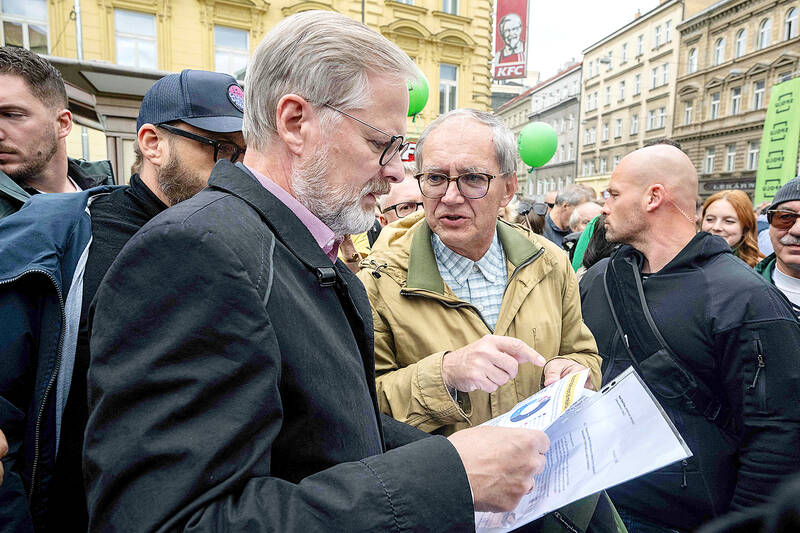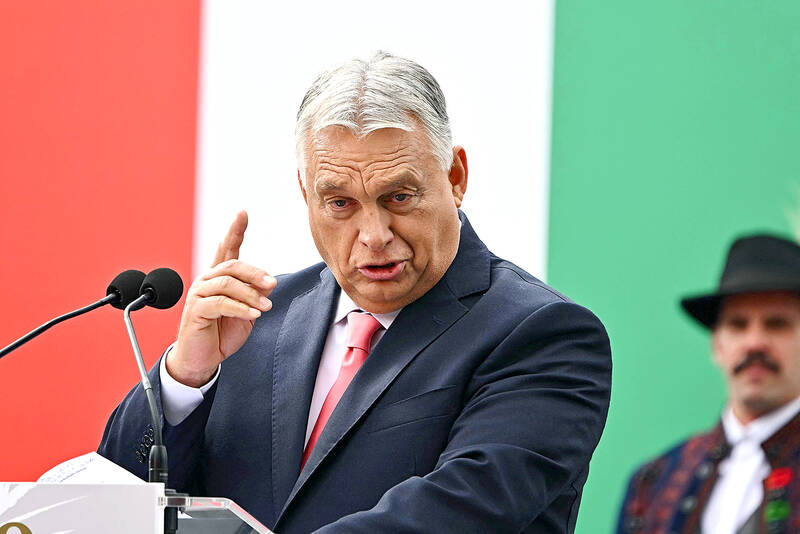Far-right parties across Europe have made gains in recent years as voters worry about the war in Ukraine and economic downturns.
Ahead of the Czech election on Friday and Saturday, voters in EU members Czech Republic, Hungary and Slovakia muse over the future of democracy.
‘PAY ATTENTION TO OUR COUNTRY’

In a square in the northern Czech town of Frydlant, retired teacher Stanislava Krausova listened to billionaire ex-premier Andrej Babis, a self-described “Trumpist” vowing to put Czech interests first and cut military aid to Ukraine.
His ANO party is expected to top the polls with about 30 percent support in the country of 10.9 million people, putting him in the driving seat to try to cobble together a ruling coalition.
“We should first pay attention to our country and resolve our own problems,” Krausova said, adding that migration “has simply got out of hand.”

Photo: AFP
“Our own people don’t have a job here, I don’t know how many are below the poverty line, and so it doesn’t make sense to accept others, especially Afghans, Syrians, but even the Ukrainians,” she said.
Krausova said her entire family were Babis “fans,” backing his calls for a truce in Ukraine, invaded by Russia since 2022.
“Many young people have died there. So I’m definitely in favor of a peaceful solution, no matter how they do it,” she said.
In the nearby town of Hejnice, where Babis also campaigned, Eliska, a retired teacher who declined to give her surname, was walking a bichon dog named Babis after the 71-year-old tycoon.
She said she was voting for the far-right Freedom and Direct Democracy (SPD) movement of Tokyo-born entrepreneur Tomio Okamura.
“I’m afraid the SPD is right in that migration is a big threat,” she said, adding the culture of those arriving “is so different from ours.”
‘STANDS UP FOR HUNGARY’
Further south in Hungary, nationalist Prime Minister Viktor Orban’s rule since 2010 is facing a challenge from a former ally who is now leading the opposition ahead of next year’s polls.
But in the countryside, Orban can still rely on rural voters for support. Since 2010, his alliance has won almost every rural constituency in the parliamentary elections.
In Kenderes — a town of around 4,500 people — cashier Irma Somodi says her fondness for Orban stems from a government program for women, which allows her to retire after 40 years of work.
“I also like that he stands up for Hungary. He doesn’t let in refugees,” the 59-year-old said in the town, famous as the birthplace of Hungarian interwar leader and Hitler ally Miklos Horthy.
“There are no jobs here right now; if the migrants came in, it would be even worse,” she added.
Others credit the premier for keeping the country out of the Ukraine conflict, echoing familiar narratives from pro-government media about the war and migration.
“Food and other stuff may be more expensive, but at least we don’t have to fear being conscripted and leaving our families behind,” said 45-year-old entrepreneur Rudolf Burai.
‘NO ONE ELSE’
In the western Slovak town of Topolcany, where nationalist Prime Minister Robert Fico was born and raised, Ivan Herda, a 63-year-old retiree, said he always voted for him as he “no one else is up to the task.”
Fico returned to power in 2023, but has seen protests over drawing his country closer to Russia, including meeting Russian President Vladimir Putin.
“Why should there be uproar when he’s in Russia?” Herda said, adding “nobody shouted” either when Fico visited the US, Britain or France.
“What the opposition is doing today is nonsense — excuse me — but crawling up Ukraine’s backside and ignoring Israel. That’s total nonsense,” he added.
But others in the town, a stronghold of Fico’s Smer party, are disappointed.
Eva Konecna, 70, and Maria Ursulova, 77, both said they know Fico from his childhood but now will not vote anymore.
“We’re fed up with the rising prices,” Konecna said, adding her meager pension is “not even enough for rent and medicine.”

US President Donald Trump may have hoped for an impromptu talk with his old friend Kim Jong-un during a recent trip to Asia, but analysts say the increasingly emboldened North Korean despot had few good reasons to join the photo-op. Trump sent repeated overtures to Kim during his barnstorming tour of Asia, saying he was “100 percent” open to a meeting and even bucking decades of US policy by conceding that North Korea was “sort of a nuclear power.” But Pyongyang kept mum on the invitation, instead firing off missiles and sending its foreign minister to Russia and Belarus, with whom it

When Taiwan was battered by storms this summer, the only crumb of comfort I could take was knowing that some advice I’d drafted several weeks earlier had been correct. Regarding the Southern Cross-Island Highway (南橫公路), a spectacular high-elevation route connecting Taiwan’s southwest with the country’s southeast, I’d written: “The precarious existence of this road cannot be overstated; those hoping to drive or ride all the way across should have a backup plan.” As this article was going to press, the middle section of the highway, between Meishankou (梅山口) in Kaohsiung and Siangyang (向陽) in Taitung County, was still closed to outsiders

Many people noticed the flood of pro-China propaganda across a number of venues in recent weeks that looks like a coordinated assault on US Taiwan policy. It does look like an effort intended to influence the US before the meeting between US President Donald Trump and Chinese dictator Xi Jinping (習近平) over the weekend. Jennifer Kavanagh’s piece in the New York Times in September appears to be the opening strike of the current campaign. She followed up last week in the Lowy Interpreter, blaming the US for causing the PRC to escalate in the Philippines and Taiwan, saying that as

The Chinese Communist Party (CCP) has a dystopian, radical and dangerous conception of itself. Few are aware of this very fundamental difference between how they view power and how the rest of the world does. Even those of us who have lived in China sometimes fall back into the trap of viewing it through the lens of the power relationships common throughout the rest of the world, instead of understanding the CCP as it conceives of itself. Broadly speaking, the concepts of the people, race, culture, civilization, nation, government and religion are separate, though often overlapping and intertwined. A government